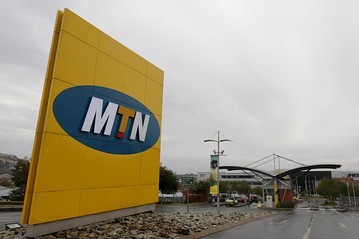In a week when it’s been pouring, the renewal of MTN’s licence must come as a silver lining. It could have been worse. With the company’s shares taking a beating and the Johannesburg Stock Exchange investigating it for possible insider abuse, who knows if the worst is over? It all started last week, when the Nigerian Communications Commission slammed a record fine of $5.2billion on the company for failing to shut out 5.1million subscribers who had not registered their SIM cards.
With the fine, MTN toppled Siemens’ record $1.6billion fine imposed by US courts in 2008 for bribery and corruption cases involving the company in the US and Germany.
If MTN had any reason at all to flout the NCC’s deadline it would simply be because after over one decade of doing business in Nigeria, it knows that the tail wags the dog.
Yet, the dog does not need to eat the tail to prove a point. It’s MTN’s peculiar misfortune that the NCC appears to be waking up from a sleep of death during which the commission’s self-inflicted shady deals and lawlessness in spectrum management then – and even under the current APC administration – cost the country billions of dollars. Has the commission turned the page? That’s a story for another day.
Advertisement
According to a Bloomberg report, full payment of the fine would amount to half the ongoing value of MTN’s operations in Nigeria. Another estimate, derived from the Central Bank of Nigeria, says the full penalty will exceed the country’s income from oil in the second quarter of this year or amount to one and a half times the yearly capital expenditure.
Sure Nigeria needs the money. With revenues down nearly 50 per cent as a result of the fall in oil prices and the economy in a near shambles for the theft and incompetence of the last government, President Muhammadu Buhari’s government cannot ignore any potential revenue source.
Other narratives have cited more than money to justify MTN’s current misery. Unofficial accounts cite security concerns, including the kidnap of the former minister of finance and secretary to the government of the Federation, Olu Falae, whose abductors were alleged to have used unregistered MTN lines, making their arrest more complicated and dangerous than it should have been.
Advertisement
There’s also the unwritten – and unspoken – grouse. Resentment for its own sake is the fate and abiding misery of all businesses that do well, especially outside their native land. Even in a globalised world, such resentment remains a headache and MTN may well be the latest victim.
With a phone licence of $285million purchased in 2001, MTN has returned a six-fold yield on investment, emerged a market leader with 62million subscribers, and nursed a craving for more business that landed it a hotly contested $154million Pay-TV licence only in September.
Thousands of Nigerian subscribers who have watched the fortunes of the company grow still regard MTN as South Africa’s Robin Hood, even though Nigeria remains its biggest market. Customers who struggle daily with poor quality service – regardless of what the company might justifiably say about outrageously high costs of doing business – think the penalty is their revenge. Why should they care?
It’s a mild, but often dangerously popular form of xenophobia; a vicarious attack on a South African company loathed for “taking all our profits away.”
Advertisement
Is there any basis for the widespread speculation that a competitor with very strong political connections may be turning the screw on the MTN?
It apparently does not seem that such sentiments played any role in the MTN fine. Part IV, section 19 (1) of the NCC (Regulation of Telephone Subscribers) Regulation 2011, empowers the commission to impose the exact penalty it imposed. Has the regulator been fair, transparent – and seen to be so – in this particular case? It’s hard to argue to the contrary. Common sense would, however, clearly suggest that insisting on a crippling penalty could create the impression that there’s more to all this than meets the eye.
For every MTN that succeeds, there are scores of businesses in the value chain – base station construction firms, engineering companies, property owners, suppliers, dealers and so on that depend on them to create jobs. NCC or any other regulator cannot ignore the potential impact of full penalty at a time when investments are falling and the economy is hurting. Even as a matter of self-interest, the regulator cannot expect to cripple MTN and achieve its target of $160billion revenue in 10 years.
NCC needs to review the penalty, not only because it’s the common sense thing to do but also because it has a poor record of complying with its own rules – whether in the sale of spectrum or even the registration of subscribers, the very basis for the MTN fine.
Advertisement
Whereas Part II, Section II (2) of the NCC (Registration of Telephone Subscribers) Regulation 2011 excludes the regulator from incurring any costs on subscriber registration, the Jonathan government approved N6.1billion for the NCC in 2011 for SIM card registration. The former Executive Vice Chairman, Eugene Juwah, claimed at the time that the money was “to register 80million subscribers.” Well, that did not happen.
The commission returned for more money in 2012, forcing Abike Dabiri then a member of the House of Representatives to insist that, “the commission must explain to Nigerians how the money was spent.” Well, again, that did not happen.
Advertisement
If after breaking its own law three years ago, spending N6.1billion and then leaning on the four other telcos to spend about N45billion, the NCC still managed to get the registration done, the entire subscription base would have been covered by now.
It’s just as well that the dog should wag the tail; but chewing off the tail completely is another matter.
Advertisement
Ishiekwene is the Managing Director/Editor-In-Chief of The Interview and a member of the editorial board of the Paris-based Global Editors Network.
Advertisement
Add a comment







